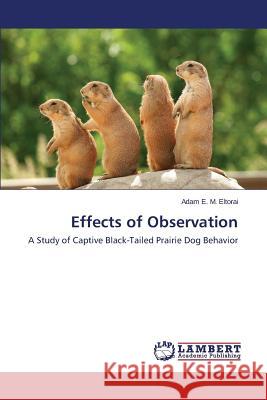Effects of Observation » książka
Effects of Observation
ISBN-13: 9783847338819 / Angielski / Miękka / 2013 / 60 str.
Black-tailed prairie dogs (Cynomys ludovicianus) are diurnal, omnivorous rodents that live in intricate cities. Black-tailed prairie dog social complexity rivals that of some primates, and, in some respects, resembles the behavior of humans. Due to the rich variety of readily-observable, sophisticated behaviors such as coloniality, infanticide, anti-predator behaviors, kin recognition, cooperation, conflict, and reproductive success, the black-tailed prairie dog is a wonderful model species for the study of behavior. Using a captive population of black-tailed prairie dogs, we were able to quantify the effects of observation on key behaviors. Our findings have potentially significant implications for observational research studies and offer further insights into higher-ordered animal behavior.
Black-tailed prairie dogs (Cynomys ludovicianus) are diurnal, omnivorous rodents that live in intricate cities. Black-tailed prairie dog social complexity rivals that of some primates, and, in some respects, resembles the behavior of humans. Due to the rich variety of readily-observable, sophisticated behaviors such as coloniality, infanticide, anti-predator behaviors, kin recognition, cooperation, conflict, and reproductive success, the black-tailed prairie dog is a wonderful model species for the study of behavior. Using a captive population of black-tailed prairie dogs, we were able to quantify the effects of observation on key behaviors. Our findings have potentially significant implications for observational research studies and offer further insights into higher-ordered animal behavior.











